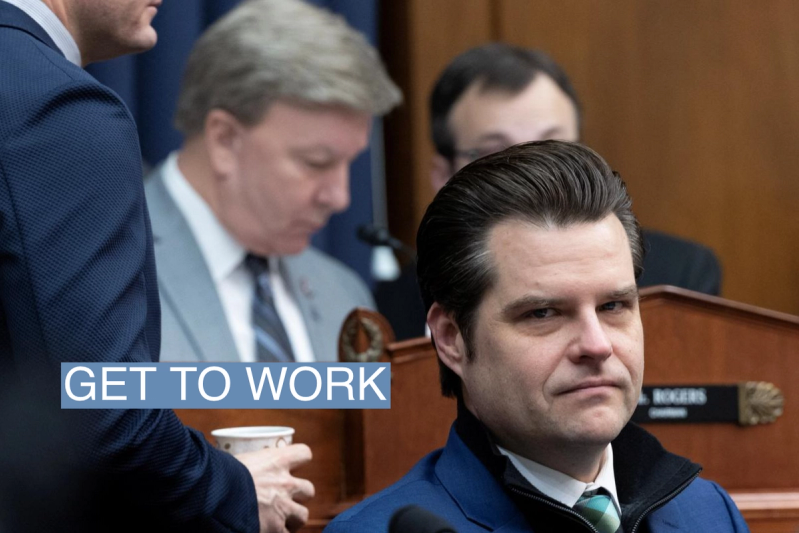The News

Rep. Matt Gaetz is trying to convince his fellow Republicans to demand new work requirements for Medicaid as part of a deal to raise the debt ceiling.
The Florida congressman, who has been enjoying new influence within his party after leading the surprisingly effective conservative revolt in last month’s House speaker battle, recently broached the idea on Fox News. He tells Semafor that he’s now “socializing” the concept among colleagues, including Speaker Kevin McCarthy.
He specifically wants to tighten Medicaid eligibility rules on “able-bodied working-age adults,” particularly in states which expanded the health insurance program for the poor under the Affordable Care Act. He said he sees it partly as a solution to recent labor shortages.
“Work requirements are proving to be a very unifying concept with my colleagues,” he said in a phone interview, adding he’s had “a very positive reception” to the idea, including from McCarthy. The speaker’s office didn’t respond to multiple requests for comment.
Rep. Don Bacon, a moderate Nebraska Republican, said Gaetz approached him about discussing it in-depth during the House Armed Services hearing on Thursday. “I’ll have an open mind to hear what he has to say,” he told Semafor.
Rep. Byron Donalds, R-Fla. told Semafor he was planning to speak with Gaetz about the idea, but was already warm to it. “If you’re able-bodied and you can gain employment, why are you on Medicaid unless that was just a pure poverty situation?” he said. “So do I think there’s some avenues to look at? Yeah.”
Joseph’s view
It wouldn’t be surprising if Gaetz’s pitch caught on among some House Republicans since attaching work requirements to Medicaid is already a longstanding conservative goal. Aside from being a sure nonstarter with Democrats, targeting Medicaid carries political risks. It’s a colossal program currently covering roughly 84 million Americans, many of them elderly and children in lower-income households. Medicaid expansions have proven popular with voters in a string of state ballot referendums and the Trump administration’s failed attempt to slash it led to serious public backlash.
As a policy matter, threatening to kick people off Medicaid doesn’t appear to be a very effective way of getting more Americans to work. In 2018, the Trump administration offered states waivers to impose their own work requirements on the program. Most states that applied never put their new restrictions in place because of legal challenges or implementation problems.
But in Arkansas, where new work rules went into effect for almost a year before being blocked in federal court, about 18,000 people lost their coverage, including many who should have still been eligible but simply appeared to get tripped up by the new paperwork. Many enrollees didn’t even know about the new rules. A study in Health Affairs later found that, for those affected, “work requirements did not increase employment” after 18 months.
Separate research has consistently indicated that access to stable health coverage strengthens a person’s ability to keep their job. That may help explain why stripping insurance doesn’t necessarily boost employment.
“A work requirement on Medicaid adds a layer of bureaucratic red tape to a program that’s already complicated for people to navigate,” Larry Levitt, executive vice president for health policy at the Kaiser Family Foundation, said. “The experience has been that people lose coverage, but it doesn’t really encourage work.”
If Gaetz is truly hoping to solve a labor shortage, it’s not clear that adding work requirements to Medicaid would even target the right pool of potential workers. Matt Darling, an employment policy fellow at the centrist Niskanen Center, pointed out that senior citizens are the only group that is still working at much lower rates than before COVID.
“You don’t really see large declines in employment until you start looking at the 70-plus population,” he said. That group, of course, tends to rely on Medicare.
Room for Disagreement
One House Republican cautioned it was too early to tell whether a push for work requirements would gain a foothold in spending discussions, but expressed enthusiasm for the overarching idea.
“There are a lot of ideas floating around right now. We’re early on in the process of analyzing the debt ceiling issue,” Rep. Dusty Johnson, R-S.D. told Semafor. “I’d say that work requirements for able-bodied young Americans without dependents at home is a critically important part of the American dream.”
The View From West Virginia
They haven’t been on his radar, but one key Senate Democrat told Semafor he wanted to keep an open mind about fresh Medicaid work requirements. “You want to help people get back into the workforce and that was Bill Clinton, welfare to work. I always supported that so we’ll have to see what it is — I haven’t seen it,” Sen. Joe Manchin, D-W.Va., told Semafor.

